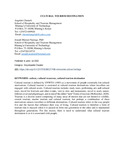| dc.description.abstract | Cultural tourism is defined by UNWTO (1985) as a movement of people essentially for cultural motivations. Cultural tourism is cocreated at cultural tourism destinations where travellers are engaged with cultural assets. Cultural tourism includes study tours, performing arts and cultural tours, travel for festivals and other events, visit to sites and monuments, travel to study nature, folklore or art and pilgrimages, and is one of the oldest “new” forms of tourism (McKercher, 2020). Tourism is a diverse sector comprising of many areas of interest that are not limited to wildlife, coastal tourism, marine tourism and cultural tourism, but perhaps a combination of these motivations attracts travellers to different destinations. Cultural tourism refers to the way people live and the factors that influence their way of living. Cultural tourism is therefore a form of tourism that is enjoyed when it is passed on from one generation to the other and is maintained throughout generations. For this reason, there is need to understand what cultural tourism destination is as it is associated with people. | en_US |

